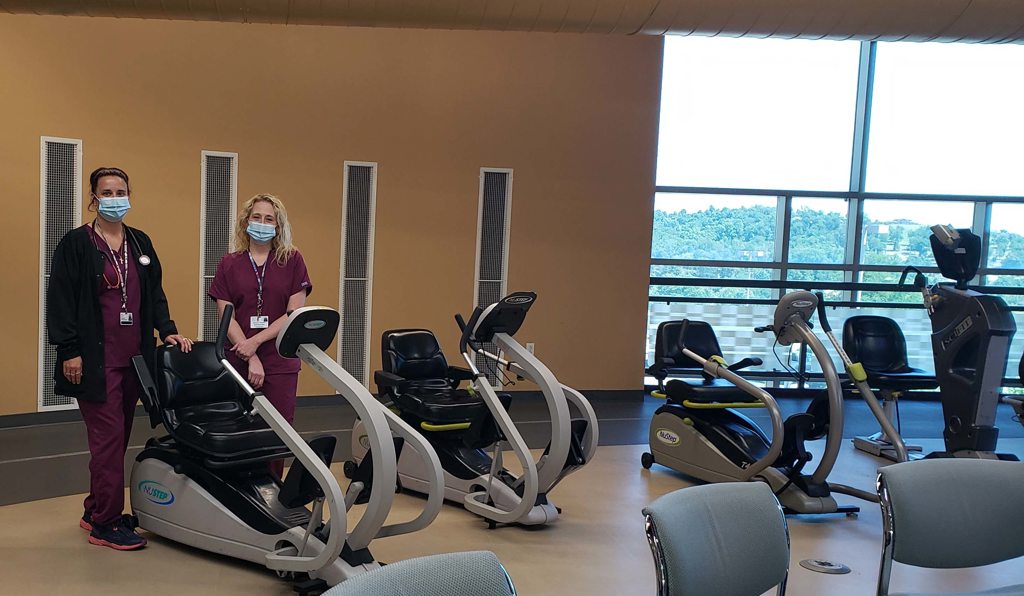Problems breathing? Pulmonary rehabilitation can help.
Chronic lung issues that leave you short of breath, such as COPD and asthma, can leave you feeling anxious and wondering if you can perform daily tasks such as carrying the laundry, mowing the lawn or exercising.
Pulmonary rehabilitation can help teach you how to be more in control of your breathing so you can build your strength, reduce shortness of breath and increase your energy and endurance. Pulmonary rehab also helps you learn how to safely exercise—which is critical to your overall health.

What causes breathing problems?
For some people, breathing issues are a short-term problem. For example, exercise may cause shortness of breath for a few minutes, while a cold or congested sinuses can cause symptoms for a week or two. But for others, breathing problems are a chronic, long-term issue.
“Pulmonary Rehab has helped people with chronic lung conditions such as asthma, COPD, emphysema, pulmonary fibrosis, interstitial lung disease and post COVID to maintain a better quality of life. For many Pulmonary Rehab participants, everyday tasks become easier and some can return to activities that they once enjoyed but became too difficult due to their lung disease.” said Deb Querry, BS, RRT, Director of Cardiopulmonary Services at Penn Highlands Huntingdon.
“Some of the chronic conditions, such as COPD and emphysema, are often caused by smoking, which damages the airways that carry air to the lungs,” said Barbara Schmidt, RN, BSN, Supervisor Cardiac and Pulmonary Rehabilitation at Penn Highlands Mon Valley. “Breathing problems can also be caused by allergies and chronic sinusitis, pneumonia, tuberculosis and other serious conditions.”
How does pulmonary rehabilitation help?
Pulmonary rehabilitation can help individuals with breathing problems build strength, improve anxiety or depression and make it easier to do daily activities. In a rehabilitation program, you will learn how to use breathing techniques, such as pursed lip breathing or diaphragmatic breathing, to reduce shortness of breath, clear mucus from your lungs and control your breathing when you’re physically active or under stress. You may also learn exercise techniques to help strengthen the muscles you use to breathe and build stamina and endurance.
Rehabilitation programs can also include mental health counseling to help you cope with the anxiety and stress that comes with breathing issues, nutrition counseling to help you eat the right foods for your specific condition and smoking cessation programs if you need help to quit. Your pulmonary rehab team may also recommend medication to open your airways or oxygen therapy to deliver oxygen to your lungs during physical activity.
Who can benefit from pulmonary rehabilitation?
You could benefit from pulmonary rehab if you have a chronic lung condition that causes you to become short of breath or tired when you try to do any physical activity, including walking up a flight of stairs or doing household chores. You are also a candidate if you are preparing for or recovering from a recent lung surgery or if you have:
- Asthma
- COPD (chronic obstructive pulmonary disease, which includes emphysema and chronic bronchitis)
- Bronchiectasis
- Pulmonary fibrosis
- Pulmonary hypertension
- Interstitial lung disease
- Any chronic pulmonary condition
How long does pulmonary rehabilitation last?
Typically, patients will come in two or three times a week for pulmonary rehabilitation,” said Mrs. Schmidt. “The entire program could last anywhere from several weeks to several months.”
Both Mrs. Schmidt and Mrs. Querry emphasized that pulmonary rehabilitation programs may be covered by medical insurance for people who meet the qualifying criteria.
“Pulmonary rehab is a big commitment, but being able to breathe easier and more comfortably makes a giant difference in quality of life,” said Mrs. Querry.
The Pulmonary Rehabilitation Program at Penn Highlands Healthcare includes education, exercise, training and support specifically to help people have a better quality of life. Pulmonary Rehabilitation is offered at Penn Highlands Brookville, Penn Highlands Clearfield, Penn Highlands DuBois, Penn Highlands Huntingdon and Penn Highlands Mon Valley. For more information visit, phhealthcare.org/pulmonaryrehab.
